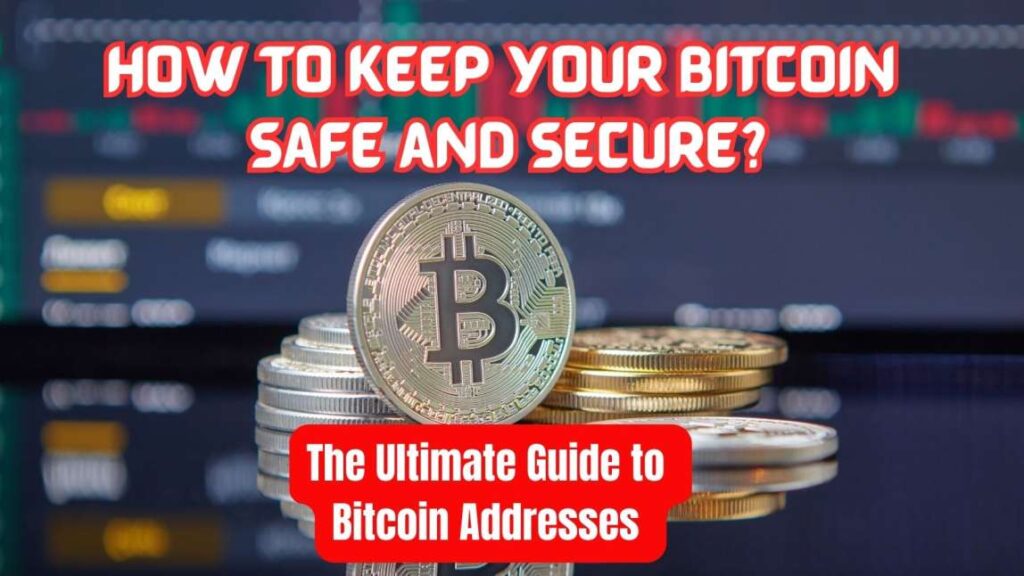In this article, we are going deep to discuss what is a btc wallet address is, how Bitcoin addresses work, and what safety and security of Bitcoin addresses we should consider
Bitcoin is a digital currency that was created in 2009 by an anonymous person or group of people under the name Satoshi Nakamoto. Bitcoin is decentralized, meaning that it is not subject to government or financial institution control. Bitcoin transactions are verified by network nodes through cryptography and recorded in a publicly disseminated ledger called a blockchain.
What is a btc wallet address?
Bitcoin Wallet is a software program that stores Bitcoin addresses and private keys. A Bitcoin address is a unique identifier that is used to send and receive Bitcoin. It is similar to an email address, but it is much more secure. Bitcoin addresses are not case-sensitive, and they are not reversible. This means that you cannot reverse engineer a Bitcoin address to find a public or private key.

If so, what is the btc wallet address? A BTC wallet address is a unique identifier that is used to send and receive Bitcoin. The cryptographic key used to sign Bitcoin transactions is a cryptographic key that is used to sign Bitcoin transactions. BTC wallet addresses are not case-sensitive and are not reversible. This means that you cannot reverse engineer a Bitcoin address to find a public or private key.
How Do Bitcoin addresses work?
Bitcoin addresses are hashes of public keys. A public key is a cryptographic key that is used to sign Bitcoin transactions. When you create a Bitcoin wallet, a public key is generated for you using cryptography. The public key is then hashed, using a cryptographic function called SHA-256, to create a Bitcoin address.
The Bitcoin address is the unique identifier that you use to send and receive Bitcoin. When you want to send Bitcoin to someone, you need to know their Bitcoin address. You can find someone’s Bitcoin address by looking at their public key, or by asking them for it.

Bitcoin addresses are not case-sensitive. This means that it doesn’t matter if you type a Bitcoin address in lowercase or uppercase letters. The Bitcoin network will still recognize the address and send the Bitcoin to the correct recipient.
Bitcoin addresses are also not reversible. This means that you cannot reverse engineer a Bitcoin address to find a public key or private key. The private key is the secret key that you use to sign Bitcoin transactions. If someone were to find your private key, they could steal your Bitcoin.
This is why it is important to keep your Bitcoin addresses and private keys safe and secure. You should never share your private key with anyone, and you should only store your Bitcoin addresses in a secure location.
Here are some additional details about how Bitcoin addresses work:
- Bitcoin addresses are 26 to 35 characters long and are made up of letters and numbers.
- Bitcoin addresses start with the letter “1” or “3”.
- Bitcoin addresses are not reversible, so you cannot find the public key or the private key from the Bitcoin address.
- Bitcoin addresses are not case-sensitive, so it doesn’t matter if you type a Bitcoin address in lowercase or uppercase letters.
Also Read: The Ultimate Beginner’s Guide to Bitcoin Mining: Maximise Your Earnings and Minimise Your Risks
Safety and Security of Bitcoin Addresses
Bitcoin addresses are essential for sending and receiving Bitcoin. However, it is important to keep them safe and secure. If someone were to get your Bitcoin address, they could steal your Bitcoin.
Here are some tips for keeping your Bitcoin addresses safe and secure:
- Do not share your Bitcoin addresses with anyone you do not trust. This includes friends, family, and even your significant other. If you need to share your Bitcoin address with someone, make sure you trust them completely.
- Store your Bitcoin addresses in a secure location. This could be a password manager, a hardware wallet, or even a piece of paper in a safe place.
- Back up your Bitcoin addresses regularly. This way, if you lose your Bitcoin address, you can still access it.
Also, consider these tips
- Use a strong password for your Bitcoin wallet.
- Enable two-factor authentication for your Bitcoin wallet.
- Be careful about what websites you visit and what links you click on. Phishing scams are a common way for hackers to steal Bitcoin addresses.
- Keep your software up to date. Software updates often include security patches that can help protect your Bitcoin addresses.
I hope these tips have given you the idea of keeping your Bitcoin addresses safe and secure. If you have any questions, please feel free to comment on this article below

The Risks to Bitcoin Addresses
These are some additional risks to Bitcoin addresses:
- Phishing attacks. Phishing attacks are a common way for hackers to steal Bitcoin addresse. They will send you an email or text message that looks like it is from a legitimate source, such as a Bitcoin exchange or wallet provider. The email or text message will often contain a link that, when clicked, will take you to a fake website that looks like the real website. Once you enter your Bitcoin address and password on the fake website, the hacker will steal your information.
- Malware attacks. Malware attacks can also steal your Bitcoin addresses. Malware is software that is designed to harm your computer. It can be installed on your computer in a variety of ways, such as by clicking on a malicious link, opening an infected attachment, or downloading a file from an untrusted source. Once malware is installed on your computer, it can steal your Bitcoin address and other sensitive information.
- Cold storage attacks. Cold storage is a method of storing Bitcoin offline. This makes it more secure than storing Bitcoin online, but it is also more vulnerable to physical attacks. If someone were to steal your cold storage device, they could access your Bitcoin address and steal your Bitcoin
How to Protect Yourself from Phishing Scams
Phishing scams are a common way for hackers to steal Bitcoin addresse. They will send you an email or text message that looks like it is from a legitimate source, such as a Bitcoin exchange or wallet provider. The email or text message will often contain a link that, when clicked, will take you to a fake website that looks like the real website. Once you enter your Bitcoin address and password on the fake website, the hacker will steal your information.
Here are some tips to protect yourself from phishing scams:
- Be careful about what emails and text messages you open. If you are not sure if an email or text message is legitimate, do not open it.
- Never click on links in emails or text messages from people you do not know. If you need to go to a website, type the URL into your browser yourself.
- Check the URL of the website carefully before entering any information. Make sure the URL is spelled correctly and that it matches the website you are expecting to visit.
- Use a strong password for your Bitcoin wallet. Your password should be at least 12 characters long and contain a mix of uppercase and lowercase letters, numbers, and symbols.
- Enable two-factor authentication for your Bitcoin wallet. Two-factor authentication adds an extra layer of security to your Bitcoin wallet by requiring you to enter a code from your phone in addition to your password when you log in.
- Keep your software up to date. Software updates often include security patches that can help protect you from phishing scams.
Also Read: Become a Bitcoin Mining Super Expert: The 7 Steps Complete Guide
Additional Things You Should Know When Using Bitcoin Addresses
The difference between a Bitcoin address and a Bitcoin wallet.
The Bitcoin address is not the same as the Bitcoin wallet. A Bitcoin address is a unique identifier that is used to send and receive Bitcoin. Bitcoin Wallet is a software program that stores Bitcoin addresses and private keys.
Different types of Bitcoin addresses, such as legacy addresses and SegWit addresses.
There are two main types of Bitcoin addresses: legacy addresses and SegWit addresses. Legacy addresses are the original type of Bitcoin addresses. SegWit addresses are a newer type of Bitcoin address that is more efficient and can handle more transactions.
Tips on how to create a secure Bitcoin address
It is important to create a secure Bitcoin address. When creating a Bitcoin address, it is important to use a strong random number generator to generate the public key. You should also keep your Bitcoin address private and only share it with people you trust.
Warnings about the dangers of phishing scams that target Bitcoin have been addressed.
Phishing scams are a common way for hackers to steal Bitcoin addresses. They will send you an email or text message that looks like it is from a legitimate source, such as a Bitcoin exchange or wallet provider. The email or text message will often contain a link that, when clicked, will take you to a fake website that looks like the real website. Once you enter your Bitcoin address and password on the fake website, the hacker will steal your information
Frequently Asked Questions (FAQs)
Q. What is a Bitcoin address?
A Bitcoin address is a unique identifier that is used to send and receive Bitcoin. It is a hashed version of a public key, which is a hashed version of the public key.
Q. How does a Bitcoin address work?
When you create a Bitcoin address, a public key is generated for you using cryptography. The public key is then hashed, using a cryptographic function called SHA-256, to create a Bitcoin address.
The Bitcoin address is the unique identifier that you use to send and receive Bitcoin. When you want to send Bitcoin to someone, you need to know their Bitcoin address. You can find someone’s Bitcoin address by looking at their public key, or by asking them for it.
Q. Are Bitcoin addresses case-sensitive?
No, Bitcoin addresses are not case-sensitive. This means that it doesn’t matter if you type a Bitcoin address in lowercase or uppercase letters. The Bitcoin network will still recognize the address and send the Bitcoin to the correct recipient.
Q. Are Bitcoin addresses reversible?
No, Bitcoin addresses are not reversible. This means that you cannot reverse engineer a Bitcoin address to find a public key or a private key. The private key is the secret key that you use to sign Bitcoin transactions. If someone were to find your private key, they could steal your Bitcoin.
Q. Can I keep my Bitcoin addresses safe and secure?
Here are a few things you can do to keep your Bitcoin address safe and secure:
- Do not share your Bitcoin addresses with anyone you do not trust.
- Store your Bitcoin addresses in a secure location.
- Back up your Bitcoin addresses regularly.
- Use a strong password for your Bitcoin wallet.
- Enable two-factor authentication for your Bitcoin wallet.
- Be careful about what websites you visit and what links you click on. Phishing scams are a common way for hackers to steal Bitcoin addresses.
- Keep your software up to date. Software updates often include security patches that can help protect your Bitcoin address.
Q. What are the different types of Bitcoin addresses?
There are two main types of Bitcoin addresses: legacy addresses and SegWit addresses. Legacy addresses are the original type of Bitcoin addresses. SegWit addresses are a newer type of Bitcoin address that is more efficient and can handle more transactions.
Q. What are some additional tips for using Bitcoin addresses?
Here are some additional tips for using Bitcoin addresses:
- When creating a Bitcoin address, it is important to use a strong random number generator to generate the public key.
- You should also keep your Bitcoin address private and only share it with people you trust.
- Phishing scams are a common way for hackers to steal Bitcoin addresses. Be careful about what emails and text messages you open, and never click on links in emails or text messages from people you do not know.
- If you think that your Bitcoin address has been compromised, you should immediately change your Bitcoin address and password.
Also Read: Cryptocurrency Market Analysis for Beginners: Unlocking Key Factors to Thrive in 2023
Conclusion
Finally, we came to the end of the article on what is a btc wallet address? Bitcoin addresses are an essential part of the Bitcoin network. They are used to send and receive Bitcoin, and they are safe and secure if they are kept private and backed up.
When you create a Bitcoin address, you are given a unique identifier that can be used to send and receive Bitcoin. This identifier is called a Bitcoin address. Bitcoin addresses are hashes of public keys, which are cryptographic keys that are used to sign Bitcoin transactions.
Bitcoin addresses are not case-sensitive, so it doesn’t matter if you type a Bitcoin address in lowercase or uppercase letters. The Bitcoin network will still recognize the address and send the Bitcoin to the correct recipient.
Bitcoin addresses are also not reversible. This means that you cannot reverse engineer a Bitcoin address to find the public key or the private key. The private key is the secret key that you use to sign Bitcoin transactions. If someone were to find your private key, they could steal your Bitcoin.
This is why it is important to keep your Bitcoin addresses and private keys safe and secure. You should never share your private key with anyone, and you should only store your Bitcoin addresses in a secure location.
By following the tips in this article on what is a btc wallet address? , you can help keep your Bitcoin addresses safe and secure.
At the end of this article, I want to share these three points which you should keep in mind about Bitcoin addresses:
- Bitcoin addresses are long and complex, so it is important to copy and paste them correctly when sending or receiving Bitcoin.
- Bitcoin addresses are public, so anyone can see them. This means that you should not share your Bitcoin address with anyone you do not trust.
- If you lose your Bitcoin address, you will not be able to access your Bitcoin. This is why it is important to back up your Bitcoin addresses regularly.
Read More :
What is Curve Crypto? : A Comprehensive Guide to Understanding in 3 Steps
What is Crypto Fear and Greed Index? A Beginner’s Guide to Understand the Crypto Market
What is a smart contract ? Unlocking the Potential of smart contracts : A Beginner’s Guide






























